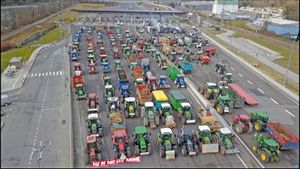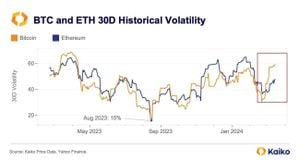President Donald Trump and French President Emmanuel Macron convened at the White House on February 24, 2025, marking a pivotal moment on the third anniversary of the Ukraine invasion, as they addressed the pressing need for solutions to the destructive conflict.
During their joint press conference, Trump expressed his dire assessment of the situation, stating, "The purpose of our meeting today is to end another battle, a really horrible one, a war, something we haven’t seen since the Second World War..." He characterized the Ukraine conflict as "a horrible, bloody mess" and indicated his belief it was nearing resolution. Trump elaborated on his efforts to engage with Russian officials, stating, "It looks like we’re getting very close [to resolving the war]." The former president highlighted his past communications with Russian President Vladimir Putin, emphasizing their potential for dialogue.
Macron, during the conference, highlighted the importance of European nations stepping up their financial commitments to security. He countered one of Trump's assertions by stating, "To be frank, we paid 60% of the total effort [in aiding Ukraine]." This direct challenge to Trump's overly simplified claims about U.S. and European spending showcased Macron's role as both supportive ally and effective counterbalance to Trump's rhetoric.
The two leaders also discussed the matter of reconstructing the Notre Dame Cathedral, with Trump expressing admiration for the project’s progress. "That was a sad day watching [Notre Dame] burn... it was a great achievement," he said, acknowledging the collaborative spirit between France and the United States. Macron thanked Trump for attending the cathedral's reopening, framing it as emblematic of their longstanding friendship.
Another focal point of their discussions was the need for solidifying peace within Europe. Macron underscored the message, noting, "Peace must not be a surrender of Ukraine..." This statement resonates strongly with the sentiment of many European leaders who see Ukraine's sovereignty as integral to the stability of the continent.
The press conference was not all about war strategies and financial commitments. Macron pointed out, "I always think it’s good to have discussions with other leaders and especially when you disagree," implying the necessity of diplomacy even amid conflicting viewpoints.
Both leaders expressed hope for the future, recognizing the potential for their nations to work collaboratively to address not only the war's immediate impacts but also long-term European security. Macron reiterated the need for European countries to share the burden of security responsibilities more equitably, saying, "We have committed to being stakeholders in these security guarantees."
Trump's remarks diverged at times, particularly when he posited talks surrounding rare earth minerals from Ukraine as part of the negotiation process for peace. The proposed agreements signify not just strategic resource allocation but also potential avenues for bilateral trade and economic partnership.
The backdrop of the conference was thick with urgency as the leaders navigated the complex realities of international relations post-invasion. Macron emphasized the existential threat Ukraine's struggle poses to broader European security, stating, "Ukraine has been able to hold the front of our collective security," pointing to the wider ramifications of the war beyond its borders.
By the end of their 40-minute session, both Trump and Macron were optimistic yet realistic about their prospects, with Macron stressing the European need to contribute more to security and Trump asserting the need for peace and accountability for U.S. investments.
Overall, the meeting underscored the challenges and possibilities within transatlantic relations, where differing perspectives can lead to constructive dialogue. The leaders signaled their intent to remain engaged as they navigate the unease surrounding U.S.-European ties, especially concerning Ukraine's future.
The outcomes of this meeting could very well shape the responses of their respective nations as they confront looming threats and opportunities stemming from the Ukraine conflict. Both leaders left the door open for future discussions, hinting at collaborative frameworks to emerge from their shared commitment to European and global security.



